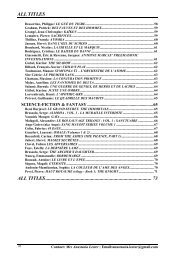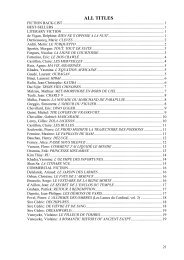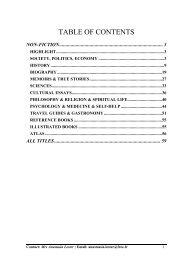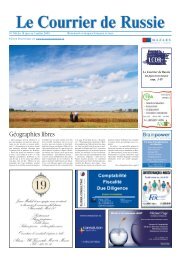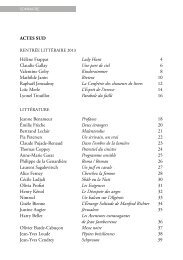LITERARY FICTION“Un livre juste, fort, nécessaire…” RegardsDjavann, Chahdortt: LA DERNIÈRE SÉANCE(Fayard, August 2013, 490 pages)Ø Djavann has composed a fast-paced novel that is fascinating to read, full of plot twists and has aninteresting, two-part construction.Ø In this intense narrative, a woman opens the doors to her past. She shares her pain, as well as her joy andlove of languages; the pages of this book deal with the body, exile, femininity, desire and survival.Ø This book will appeal to anyone who’s interested in Iran, exile and freedom. It is the moving tale of achaotic fate, encompassing reflections about exile, trauma, depression, identity and more.Chahdortt Djavann’s novels speak of exile and of adapting to a new life. In this book, she pays tribute tothe French language, a refuge within which she builds both a fate and a novel.Chahdortt Djavann was born in Iran in 1967 and moved to Turkey in 1991. In 1993, she arrived inParis, where she studied anthropology at the Ecole des Hautes Etudes en Sciences Sociales. Her editorials appearfrequently in the French press, and she gives conferences regularly throughout France, Europe and the USA. Anovelist and essayist, Chahdortt Djavann is the author of BAS LES VOILES! (Gallimard, 2003), LA MUETTE(Flammarion, 2008), and JE NE SUIS PAS CELLE QUE JE SUIS (Flammarion, 2011).“Un roman fort, une lecture à la fois captivante et éprouvante qui continue de vous habiter une fois leroman terminé. Djavann dresse un portrait de femme qui rend hommage au courage et à l'esprit de survie etinvite à réfléchir à la condition féminine au-delà de nos frontières.” Page des libraires“À travers ce roman, Djavann poursuit son combat pour le respect des femmes sur un ton toujoursalerte. Son sérieux cède parfois la place à d'étonnantes pirouettes.” Femme MajusculeGoby, Valentine: KINDERZIMMER(Actes Sud, August 2013, 224 pages)Ø A striking portrait of young Mila, whose body is like a mirror to the metamorphosis of all bodies.Ø Goby’s KINDERZIMMER is in the vein of those novelists who address history through a singleindividual’s fate, like Laurent Binet and HH.hh.Ø An incisive style with short, hard-hitting sentences that illustrate the camp’s violence.Ø • Valentine Goby, who trained as a historian, offers more than just a historical narrative. She also reflectson the necessity of language in order to survive, to escape and eventually, to bear witness.Mila, a young Frenchwoman, is a political deportee sent to Ravensbruck during World War II. For a fullyear she faces the apocalyptic reality: sick, emaciated bodies; violence and the need for language, and then theKinderzimmer, a room that houses the camp’s infants.Springtime, 1944: Mila arrives at Ravensbruck in a convoy of 400 women, all French politicaldeportees. Suddenly she is faced with a new reality: ravaged bodies, hunger, sickness and humiliation. She willneed to learn the words, to follow the orders and to live in unbelievably close quarters. In addition to the generalsense of uncertainty about what the future holds is the fact that she thinks she’s pregnant, but isn’t sure. Milashares her doubts with Teresa, the young Polish woman whose sleeping mat she shares. Teresa gives her the willto live and to accept the infant growing inside her. But as soon as he is born, the child, who she thought was hersto keep, is placed in the Kinderzimmer with all the other babies. Despite the ban, Mila manages to sneak in andsee the babies lined up in rows. Undernourished, their faces are like those of elderly people. The infants’ lifeexpectancy is just three months, and her James will succumb like the others. The nurse offers to let her adopt thechild of a woman who died in childbirth. She can work at the camp hospital and see the baby regularly. Thecountdown has begun, because Mila knows the baby won’t be able to survive for more than three months. Butthe war comes to an end, and Mila goes back to France with the child. It isn’t until years later, when the childturns 21, that Mila reveals to him that he was born in Ravensbruck.Valentine Goby adopts a choppy style, punctuated with long lists, the better to drive in the reality of thecamp and to portray the unbearable atmosphere. She focuses on the transformation of the women’s bodies,illustrated by Mila, whose unique fate blends easily into the group’s.Valentine Goby was born in 1974. In 2003, she won the University of Artois First Novel Prize forNOTE SENSIBLE (Gallimard), following Muriel Barbery. Her other books include L’ECHAPPEE (Gallimard,18Contact: Mrs <strong>Anastasia</strong> <strong>Lester</strong> ; Email:anastassia.lester@gmail.com
FICTION2007), QUI TOUCHE À MON CORPS JE LE TUE (Gallimard, 2008), DES CORPS EN SILENCE (2010) andBANQUISES (Albin Michel, 2011). She also writes for children and teens. KINDERZIMMER is her eighthnovel.“Valentine Goby a écrit un grand roman sur l'innocence, une magistrale histoire d'éveil. (…) La languede Valentine Goby [est] chaotique, organique, pleine d'effroi et d'espoir, atrocement belle.” Télérama“Une écriture sans concessions, tour à tour dépouillée et glaciale — à l'image du camp — puispoétique et bouleversante, sert ce texte virtuose qui place l'auteure parmi les grands de la littérature française.(…) Un pur chef d'œuvre.” Page des libraires“Voici dix ouvrages dans lesquels nous nous sommes plongés et qui nous ont fait basculer. (…) Onaime, parce qu'il fallait oser s'engager dans cet univers insoutenable nourri d'excréments, de supplices, de corpsemboîtés, cognés, heurtés, enjambés, dans la même masse mouvante. Valentine Goby relève ce défi.” Le Parisien“Valentine Goby ne cherche pas à démontrer, à théoriser, à prendre l'histoire de haut. Elle se placefamilièrement à côté de Mila et de ses lecteurs, les accompagne de mots et de phrases qui se transforment en unchant magnifique vers un monde sans entrave.” LirePattieu, Sylvain: LE BONHEUR PAUVRE RENGAINE(Le Rouergue, August 2013, 304 pages)Ø An unusual, atypical tale that is both a novel and a historical document based on an actual even and onauthentic archive materials.Ø A fascinating panorama of France in the 1920s: corrupted by organized crime and prostitution, it has lostits bearings.Ø The book brings back these larger-than-life characters with their colorful, street-wise attitude andlanguage.A sordid, real-life incident leads the author, a historian, into an in-depth investigation of archives fromalmost a century ago. The case is the perfect excuse for a fascinating panorama of the Roaring 20s in the south ofFrance.Marseille, 25 September 1920: Yvonne, a naive young working-class woman who became a prostitutehas been found dead. The crime, known as the “Athlete and the Pointy Nose” scandal makes headlines. Thepolice find the guilty parties, and we learn about their years in prison. This is the story that provides thebackground for the author’s portrait of a city and an era: Marseille and the post-World War I period. Pimps,gigolos, cabaret dancers, anarchist workers and bandits rub shoulders in factories and brothels, which are the keymeeting places in this historical <strong>fiction</strong> that brings a fascinating historical period back to life.Born near Marseille in 1979, Sylvain Pattieu teaches history at Paris VIII-Saint-Denis University. Hisfirst novel, DES IMPATIENTES, was published by Rouergue in August 2012. That same year, he also wroteAVANT DE DISPARAITRE, CHRONIQUE DE PSA-AULNAY, published by Plein Jour.Hugo, Boris: TROIS GRANDS FAUVES(Belfond, August 2013, 208 pages)Ø Shortlisted for the Prix Fnac The portrait of three veritable monsters: Danton, Hugo and Churchill. An“anti-biography” that is a masterpiece in terms of style, precision and insightfulness.Georges Danton, Victor Hugo, Winston Churchill: the one thing that these three heroes have in commonis that they were confronted with death at an early age, survived, and were made so much stronger for it. Troisgrands fauves or how to defy death in three lessons. Taking glimpses of important moments of their lives, HugoBoris crafts an unrelenting portraiture of these remarkable men, grasping certain truths that escaped historians.He has imagined a through line that ties the three together through history, their companionship with death thattransformed into an exceptional strength.Hugo Boris is the author of three novels, all published by Belfond: LE BAISER DANS LA NUQUE(2005), prix Emmanuel-Roblès; LA DÉLÉGATION NORVÉGIENNE (2007), the inaugural literary prize winnerof Hebdos en Région; and JE N’AI PAS DANSÉ DEPUIS LONGTEMPS (2010), prix Amerigo-Vespucci.“Hugo Boris’s novel is both classical in its writing and imaginative in its telling.” Livres Hebdo ”Unroman de larmes, de rires et de fureur...” Le Canard enchaînéContact: Mrs <strong>Anastasia</strong> <strong>Lester</strong> ; Email:anastassia.lester@free.fr 19
- Page 1: TABLE OF CONTENTSFICTION ..........
- Page 4 and 5: BEST-SELLERS 2013Blandine Le Callet
- Page 6: HIGHLIGHT FALL 2013In India, the oc
- Page 10 and 11: HIGHLIGHT FALL 2013“It’s brilli
- Page 13 and 14: Aumey, Edem: EXPLICATION DE LA NUIT
- Page 15 and 16: FICTION“Jean-Philippe Blondel dé
- Page 17: FICTIONØ Revelations about the var
- Page 21 and 22: d’Ormesson, Jean: UN JOUR JE M’
- Page 23 and 24: FICTIONA man is investigating what
- Page 25 and 26: FICTIONopening the door to a whole
- Page 27 and 28: FICTIONHis father's funduq, the bal
- Page 29 and 30: FICTIONépique sont donc au rendez-
- Page 31 and 32: FICTIONØ Important themes, like th
- Page 33 and 34: FICTIONtake the veil. Forgetting he
- Page 35 and 36: Tuil, Karine: L’INVENTION DE NOS
- Page 37 and 38: Germain, Sylvie: PETITES SCÈNES CA
- Page 39 and 40: FICTIONA whirlwind romance ensues w
- Page 41 and 42: FICTIONIn June 1984, when Julian, a
- Page 43 and 44: FICTIONYears later, another compute
- Page 45 and 46: FICTIONThis is a tale that explores
- Page 47 and 48: Meyer, Patrick-Olivier: LE MUSCLE E
- Page 49 and 50: Egémar, Béatrice: LE PRINTEMPS DE
- Page 51 and 52: FICTIONMax Gallo has always been at
- Page 53 and 54: FICTIONThis first volume covers the
- Page 55 and 56: FICTIONchange. Supported by those c
- Page 57 and 58: FICTIONJanine Boissard no longer ne
- Page 59 and 60: FICTIONBorn in Ukraine in 1967, Bor
- Page 61 and 62: FICTIONMeanwhile, as Ginette invest
- Page 63 and 64: FICTIONIris Baudry is a forensic ph
- Page 65 and 66: FICTIONin a sorry state, impossible
- Page 67 and 68: Rouau, Antoine: LE LIVRE ET L’EP
- Page 69 and 70:
FICTIONThe High Kingdom is facing i
- Page 71 and 72:
Audouin-Mamikonian, Sophie: INDIANA
- Page 73 and 74:
ALL TITLESFICTION .................
- Page 75 and 76:
ALL TITLESPessan, Eric: MUETTE ....



